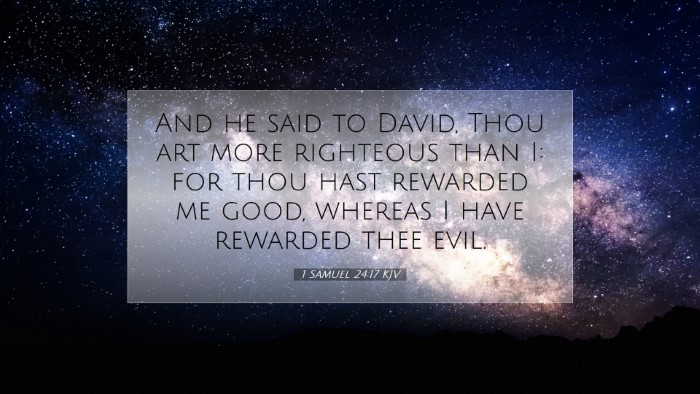Commentary on 1 Samuel 24:17
Bible Verse: "And he said to David, You are more righteous than I; for you have rewarded me good, whereas I have rewarded you evil."
Contextual Background
The narrative of 1 Samuel 24 presents a profound moment in the life of David and Saul. This event occurs during a time when Saul, the first king of Israel, is pursuing David, driven by jealousy and fear for his throne. David, having been anointed as the future king, is on the run. The exchange captured in verse 17 is significant, marking Saul's recognition of David's righteousness in stark contrast to his own malfeasance.
Insights from Commentaries
Matthew Henry's Commentary
Matthew Henry emphasizes the moral and spiritual dimensions of this encounter. Saul’s admission of wrongdoing illustrates a critical reflection on his actions. Henry notes that Saul acknowledges the grace and mercy shown by David, pointing out how David spared Saul's life despite having the opportunity to kill him. This act of mercy resonates deeply, teaching that righteousness is defined not by power or vengeance but by moral integrity and compassion.
Albert Barnes' Notes on the Bible
Albert Barnes highlights Saul’s unexpected acknowledgment of David’s righteousness as a turning point. He points out that Saul's admission serves as a fleeting moment of clarity amid his turmoil. Barnes reflects on how this verse encapsulates the essence of divine justice – that God’s favor rests on those who act righteously. It serves to remind believers that while one may be wronged, the righteous will ultimately be vindicated. Barnes also examines the implications for leadership, asserting that the true leader must possess the humility to recognize the virtues in others, even those they perceive as rivals.
Adam Clarke's Commentary
Adam Clarke provides an insightful examination of Saul’s confession to David. He notes that this admission is not only a marked acknowledgment of wrong but a profound moment of humility for Saul. Clarke assesses Saul's characterization of David as “more righteous” and elaborates on the Hebrew expressions used, underscoring the depth of Saul's regret and recognition of God’s choice in David. He discusses the notion that such humility, while not leading Saul to genuine repentance, illustrates the spiritual struggle within him. Clarke thereby invites readers to consider the complex nature of human emotions in relation to divine will.
Theological Reflections
-
The Nature of Righteousness:
This verse challenges believers to reflect on their own actions and the nature of righteousness. It asks whether our responses to the evil done against us reflect the mercy and goodness that God calls us to embody.
-
Forgiveness and Mercy:
David’s choice to spare Saul highlights the transformative power of forgiveness. Pastors and theologians are encouraged to deploy this narrative as a teaching tool on forgiveness, as it exemplifies the call to love one's enemies and extend grace even in dire circumstances.
-
Divine Providence:
Saul’s recognition of David’s righteousness reaffirms the theme of divine providence that runs throughout the text. God often works through human circumstances to uphold His purposes. For scholars, this invites deeper contemplation on how God orchestrates events for His glory and the good of His people.
Application for Believers
1 Samuel 24:17 is a call to live by faith, trusting in God’s righteousness. For pastors, this serves as a reminder to encourage congregations to engage in self-reflection and to recognize the merits of those around them, even if in conflict. This scripture can be a powerful basis for sermons on the God-driven quest for integrity over retaliation.
For students of the Word, this passage is an excellent study on the complexities of human relationships, leadership, and the moral dilemmas we face. It is a vivid illustration of the principle that God often uses the most unlikely of characters to fulfill His plans, challenging students to consider how God might be working in their own lives or within their struggles.
Conclusion
In summary, 1 Samuel 24:17 not only serves as a historical account but also as a theological resource rich with insights on righteousness, forgiveness, and divine justice. Through the reflections of Matthew Henry, Albert Barnes, and Adam Clarke, we glean valuable lessons on the moral framework within which believers are called to operate, regardless of the challenges faced. This narrative invites all—pastors, students, and theologians—to embody the virtues of grace and mercy in their own lives as they navigate the complexities of leadership, conflict, and faith.


